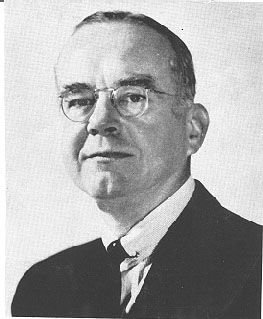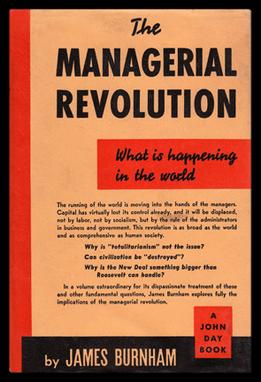James Burnham facts for kids
Quick facts for kids
James Burnham
|
|
|---|---|
 |
|
| Born | November 22, 1905 |
| Died | July 28, 1987 (aged 81) Kent, Connecticut, U.S.
|
| Alma mater | |
|
Notable work
|
The Managerial Revolution (1941) The Machiavellians: Defenders of Freedom (1943) |
| Spouse(s) |
Marcia Lightner
(m. 1934) |
| Relatives | David Burnham (brother) |
| Scientific career | |
| Institutions | New York University |
| Notable students | Maurice Natanson |
| Influences | |
| Influenced | |
James Burnham (born November 22, 1905 – died July 28, 1987) was an American thinker who studied philosophy and politics. He was a professor at New York University. His first book was about understanding philosophy.
In the 1930s, Burnham became a strong supporter of Trotskyism, a type of Marxism (ideas based on Karl Marx's writings about society and economics). Later, he changed his mind and became a very important thinker for the American conservative movement, which supports traditional values and limited government. His famous book, The Managerial Revolution, published in 1941, explored how capitalism (an economic system where private businesses own most things) might change in the future. Burnham also wrote regularly for National Review, a conservative magazine started by William F. Buckley Jr.. He believed the United States should actively fight against communism (a political system where the government controls everything) around the world.
Contents
Life Story
Early Years
James Burnham was born in Chicago, Illinois, on November 22, 1905. His father, Claude George Burnham, was an immigrant from England who worked for a railroad company. James grew up in a Roman Catholic family. However, when he was in college, he stopped believing in Catholicism and became an atheist (someone who does not believe in God). He later returned to the church just before he died.
He was a top student at Princeton University. Then, he went to Balliol College, Oxford in England, where famous writers like J. R. R. Tolkien were his teachers. In 1929, he started teaching philosophy at New York University. In 1934, he married Marcia Lightner.
His Time with Trotskyism
In 1933, James Burnham helped create the American Workers Party. He later supported its merger with another group to form the US Workers Party. In 1935, he joined the Trotskyist part of that group. During this time, he became friends with Leon Trotsky, a key figure in the Russian Revolution. Burnham also influenced other writers through his work for Partisan Review.
However, Burnham's involvement with Trotskyism did not last long. By 1937, he started to disagree with some of their main ideas. When the Trotskyists left the Socialist Party, they formed the Socialist Workers Party (SWP). Inside this new party, Burnham and his friend Max Shachtman argued with the main group. The main group, led by James P. Cannon and supported by Leon Trotsky, believed the Soviet Union was still a "workers' state" that needed protection.
Burnham and Shachtman disagreed, especially after seeing the Nazi–Soviet pact in 1939. They also saw the Soviet Union invade countries like Poland, Latvia, Lithuania, Estonia, and Finland. They believed the Soviet Union under Joseph Stalin had become a new type of controlling society. They thought it was not worthy of support from socialist movements.
In February 1940, Burnham wrote a paper called Science and Style: A Reply to Comrade Trotsky. In it, he broke away from dialectical materialism, a key idea in Marxism. He suggested other ways of thinking about the world, like those found in modern science and logic. After many discussions, Burnham and his supporters left the SWP in April 1940. They formed their own group, the Workers Party. However, Burnham soon left this group too, in May 1940. This marked the end of his involvement in radical political movements.
In 1941, Burnham published The Managerial Revolution: What is Happening in the World. This book looked at how economics and society were changing. Life magazine even listed it as one of the top 100 books from 1924 to 1944.
Working for the OSS and National Review
During World War II, Burnham took a break from teaching at NYU. He went to work for the Office of Strategic Services (OSS). This was an early version of what would later become the Central Intelligence Agency (CIA). He was asked to lead a special division focused on political and psychological warfare.
Later, during the Cold War (a long period of tension between the United States and the Soviet Union), Burnham argued for a strong approach against the Soviet Union. In his 1947 book, The Struggle for the World, he suggested that the United States, Great Britain, and other British countries should become one nation. He also called for a "World Federation" to stand against communism.
In 1955, he helped William F. Buckley Jr. start National Review magazine. This magazine often shared Burnham's views on foreign policy. Burnham wrote a column there called "Third World War," which was about the Cold War. Buckley considered Burnham the most important intellectual influence on National Review from the very beginning. Some people see Burnham as an early "neoconservative" (a type of conservative who supports using American power to promote democracy). His ideas have influenced both traditional and modern conservative groups in America.
In 1983, President Ronald Reagan gave him the Presidential Medal of Freedom. This is one of the highest awards a civilian can receive in the United States.
In November 1978, Burnham had a stroke that affected his health and memory. He passed away from cancer at his home in Kent, Connecticut, on July 28, 1987. He was buried in Kent.
His Ideas
The Managerial Revolution
Burnham's most important book, The Managerial Revolution (1941), explored the future of capitalism. He looked at how the world was changing between World War I and World War II. Burnham considered three possibilities for capitalism:
- It could last forever.
- It could collapse and be replaced by socialism.
- It could change into a new, non-socialist society.
Burnham argued that capitalism, which began around the 14th century, could not last forever. He pointed to widespread unemployment during the Great Depression as a sign that capitalism was "not going to continue much longer."
Burnham noticed similarities in the economic systems of Nazi Germany, Stalinist Russia, and America under President Roosevelt's New Deal (government programs to help the country recover from the Great Depression). He argued that a new group of "managers" had risen to power. These managers were not the owners of businesses but the people who controlled them. He said that whether a company was privately owned or government-controlled, the real power lay with the executives, managers, and government workers. They were the new ruling class, not the traditional owners.
Burnham noted that the "New Deal" was not a fully developed "managerial ideology" but showed signs of this new trend.
Later Writings
In his book The Machiavellians, Burnham further developed his ideas. He suggested that this new group of powerful managers would do better if they kept some parts of democracy. This included allowing political opposition, having a free press, and letting new leaders rise. He believed that political ideas often had problems within themselves. His work greatly influenced the conservative writer Sam Francis. Francis based his own political ideas on Burnham's concept of the "managerial revolution" and the resulting "managerial state" (a government run by experts and bureaucrats).
In Fiction
The British writer George Orwell was inspired by Burnham's book The Managerial Revolution. Burnham's ideas about power influenced Orwell's famous 1949 novel, Nineteen Eighty-Four. In 1945, Orwell noted that Burnham's prediction of the world being divided into three great empires seemed to be coming true. The powerful countries of Oceania, Eurasia, and Eastasia in Orwell's novel were partly influenced by Burnham's view of Roosevelt's America, Nazi Germany, and the Soviet Union as "managerial states."
While Orwell agreed with some of Burnham's analysis, he did not fully accept Burnham's view of managerial power. This unresolved thought helped inspire the character of O'Brien in Nineteen Eighty-Four. O'Brien is a powerful figure who discusses the nature of power and control.
Works
Books
- Introduction to Philosophical Analysis (with Philip Wheelwright). New York: Henry Holt and Company, 1932.
- The Managerial Revolution: What is Happening in the World. New York: John Day Co., 1941.
- The Machiavellians: Defenders of Freedom. New York: John Day Co., 1943. ISBN: 0895267853.
- The Struggle for the World. New York: John Day Co., 1947.
- The Case for De Gaulle: A Dialogue Between André Malraux and James Burnham. New York: Random House, 1948.
- The Coming Defeat of Communism. New York: John Day Co., 1949.
- Containment or Liberation? An Inquiry into the Aims of United States Foreign Policy. New York: John Day Co., 1953.
- The Web of Subversion: Underground Networks. New York: John Day Co., 1954.
- Congress and the American Tradition. Chicago: Regnery, 1959. ISBN: 0765809974.
- Bear and Dragon: What is the Relation Between Moscow and Peking? New York: National Review, in cooperation with the American-Asian Exchange, 1960.
- ... of the West: An Essay on the Meaning and Destiny of Liberalism. New York: John Day Co., 1964.
- The War We Are In: The Last Decade and the Next. New Rochelle, NY: Arlington House, 1967.
Book contributions
- Introduction. In: Dobriansky, Lev E. Veblenism: A New Critique. Washington: Public Affairs Press, 1957.
Pamphlets
- War and the Workers (as John West). New York: Workers Party of the United States, 1935. alternate link
- Why Did They "Confess"? A Study of the Radek-Piatakov Trial. New York: Pioneer Publishers, 1937. alternate link.
- The People's Front: The New Betrayal. New York: Pioneer Publishers, 1937. alternate link
- How to Fight War: Isolation, Collective Security, Relentless Class Struggle? New York: Socialist Workers Party & Young Peoples Socialist League (4th Internationalists), 1938.
- Let the People Vote on War! New York: Pioneer Publishers, 1939?.
- In Defense of Marxism (Against the Petty-Bourgeois Opposition) (with Leon Trotsky, Joseph Hansen and William Warde). New York: Pioneer Publishers, 1942.
Public speaking
- Why Does a Country Go Communist? An address delivered at the Indian Congress for Cultural Freedom on March 31, 1951. Bombay: Democratic Research Service, 1951.
Selected articles
- "The Case Against Adlai Stevenson." American Mercury, Vol. 76, October 1952, pp. 11-19.
- "Can Washington Conduct Political Warfare?" American Mercury, December 1952, pp. 10-24.
- "Does ADA Run the New Frontier?" National Review, Vol. 14, No. 18, May 7, 1963, pp. 355-362.
See also
 In Spanish: James Burnham para niños
In Spanish: James Burnham para niños
 | Anna J. Cooper |
 | Mary McLeod Bethune |
 | Lillie Mae Bradford |


